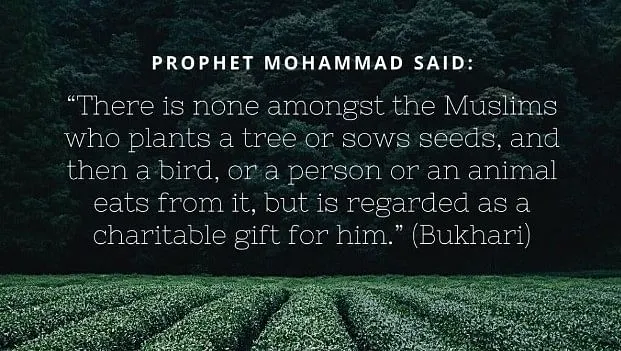Islam is focused on life; be it personal, social, commercial, environmental or spiritual. Universe is discussed in the holy Quran, be it sun or stars, cosmos or earth; flora and fauna, food chain, water cycle and ecological balance.
But unfortunately Islamic perspective on environmental protection and sustainability is least acknowledged due to our lack of understanding and habit of crediting everything good to the West.
Islam emphasised sustainability, prohibited wastage of resources and excessive use. This is evident in the verse : “And eat and drink, but be not excessive indeed, Allah likes not those who commit excess.”(Al A’raf 7:31) But we do totally opposite.
If we talk of our lavish weddings in Kashmir, every year tons of cooked rice, salad, and bakery get wasted and is dumped into rivers and fields thereby threatening environment and risking the lives of animals also. Environmentalists emphasise afforestation as a solution to global warming but this too has been emphasised by Islam.
Prophet Muhammad (SAW) encouraged planting of trees and the cultivation of agriculture and called them as good acts. This is illustrated in the hadith that “there is none amongst the Muslims who plants a tree or sows seeds, and then a bird, or a person or an animal eats from it, but is regarded as a continued charitable gift (sadqa jarya) for him.” (Al -Bukhari).
Prophet Mohammad (PBUH) always practised and taught conservation of water. Once he passed by a companion Sa’d ibn abi Waqas and said “Do not waste water while performing wudhu even if you are at a flowing river”. (ibn Majah). This hadith clearly puts the emphasis on using water judiciously and prohibition of wasting water ; this is the best solution for problem of water scarcity.
Islam is against deforestation and prohibits unnecessary cutting of trees as is evident in the following Hadith narrated by Abdullah ibn Habashi that Prophet Muhammad (SAW) said: “He who cuts a lote-tree [without justification], Allah will send him to Hellfire.” (Abu Dawud).
But what we do; we massively cut down trees for commercial purposes without realising its impact on our environment. Regarding water pollution also there is a hadith.
The Prophet (may Allah’s peace and blessings be upon him) prohibited people from urinating in stagnant water because doing that would cause it to be polluted with impurities and microbes that the urine might be carrying. This, in turn, will harm those who use such water.
In a hadith Abu Hurairah reported that the Messenger of Allah (Peace Be Upon Him) said ,”Allah curses a person who urinates in water source or on a path or in a place of shade or in the burrow of a living creature”. These values highlight Islam’s stress on avoiding pollution of critical resources and importance of cleanliness.
TAKE AWAY: We have the responsibility to take care of environment and make judicious use of resources. As goes the saying, “ what goes around comes around”; misuse of resources and exploitation of environment also backlashes and the result is in front of us; in the form of floods, droughts, water scarcity, air borne and water borne diseases, diseased crops or acid rain. Lets take a pledge to to save energy; use water judiciously; and avoid polluting environment.
Don’t throw garbage in open and make it a habit to walk, and avoid unnecessary use of private vehicles. There are many people who visit the grocery shops in their vicinity on a bike or in a car when it is both environment healthy and personal fitness booster to go on foot.
Sensible use of water while washing clothes, bathing or brushing can save lot of water. Small steps by large masses can mark huge difference. Above all let’s keep our hospitals, educational institutions and other public places clean and healthy. Show the same care and concern as we have towards our own homes.
Disclaimer: The views and opinions expressed in this article are the personal opinions of the author.
The facts, analysis, assumptions and perspective appearing in the article do not reflect the views of GK.






